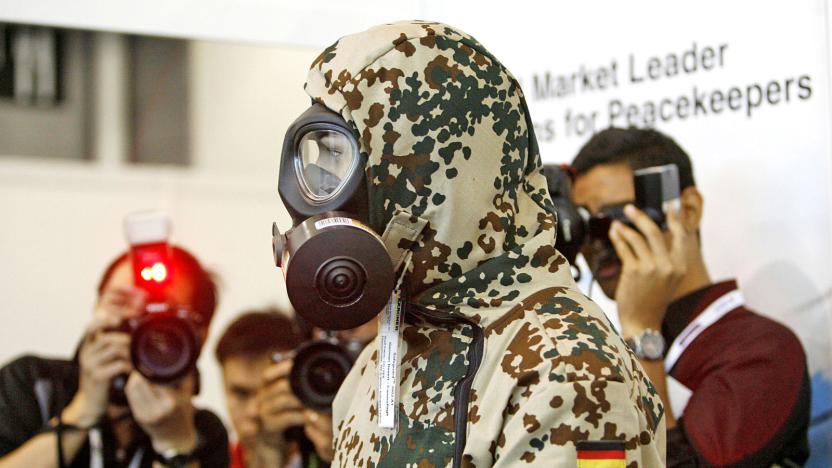Department of Defense
Latest

Amazon claims Trump's 'personal vendetta' cost it $10 billion Pentagon contract
Last month, Amazon said it would formally challenge the US Department of Defense's decision to award the $10 billion JEDI contract to Microsoft, instead of Amazon Web Service (AWS). The lawsuit, unsealed today, reveals the details behind Amazon's argument. The company claims that "AWS was the consensus frontrunner" and that not only was the Pentagon's decision based on "egregious errors on nearly every evaluation factor," it was "the result of improper pressure from President Donald J. Trump."

Jeff Bezos: US is in 'big trouble' if Big Tech rejects military contracts
Don't expect Amazon to follow companies like Google in changing its mind on military contracts. Jeff Bezos told guests at the Reagan National Defense Forum that the US is in "big trouble" if large tech companies are "turning their back" on the Defense Department. He further argued that Americans were "the good guys," and that it was imperative that the US maintained advantages over rivals in areas like spaceflight, where China appeared to be catching up.

Pentagon's draft AI ethics guidelines fight bias and rogue machines
Tech companies might have trouble establishing groundwork for the ethical use of AI, but the Defense Department appears to be moving forward. The Defense Innovation Board just published draft guidelines for AI ethics at the Defense Department that aim to keep the emerging technology in check. Some of them are more practical (such as demanding reliability) or have roots in years-old policies (demanding human responsibility at every stage), but others are relatively novel for both the public and private spheres.

DoD's $10 billion 'Jedi' cloud contract goes to Microsoft over Amazon
After a couple years of competition, the US Department of Defense has awarded a lucrative contract for cloud computing services to Microsoft. It beat out Amazon, the only other remaining competitor after others were weeded out or, in the case of Google, dropped out citing "AI principles." Dubbed the Jedi Cloud contract, it could be worth $10 billion over the next ten years as the agency replaces legacy systems. In a statement, DoD Chief information Office Dana Deasy said "The National Defense Strategy dictates that we must improve the speed and effectiveness with which we develop and deploy modernized technical capabilities to our women and men in uniform. The DOD Digital Modernization Strategy was created to support this imperative. This award is an important step in execution of the Digital Modernization Strategy."

New wristband could predict aggressive outbursts in people with autism
Researchers are hoping a new wearable wristband will help predict aggressive outbursts in people with autism. The device monitors heart rate, sweat production, skin surface temperature and arm movements. It can predict outbursts 60 seconds ahead of time with 84 percent accuracy. While that might not seem like much time, it could give caretakers an opportunity to relax the individual wearing the wristband and make sure everyone is safe.

Trump asks for $9.6 billion to bolster cybersecurity in 2020 budget
President Donald Trump has revealed his proposed budget for the 2020 fiscal year, which "supports the creation" of Space Force (USSF) as the sixth branch of the armed forces. The White House also hopes to bolster cybersecurity and NASA exploration missions.

The Department of Defense needs help designing a biohazard suit
The Department of Defense is looking for a few good creators to help bring a brand new biohazard suit to life. The Chembio Suit Challenge is being held by the Chemical and Biological Defense division within the US military, and there's a $250,000 prize hanging in the balance for ideas on how to create a better protective suit.

Pentagon plans to buy smarter to keep its tech edge
The Pentagon thinks the US is losing its technological dominance over adversaries and is changing the way it develops and buys new weapons. It just rolled out a program called "Better Buying Power 3.0" designed to better tap into the latest technology and significantly bolster cybersecurity. Defense under secretary Frank Kendall said that the program is motivated by "a steady erosion of our technological superiority" caused in part by a shrinking modernization budget that's often raided to pay for day-to-day operations.

UK police arrest 57 people as part of 'cyber crime strike week'
What's the most effective way to discourage cyber crime across Britain? There's no definitive answer, but the latest tactic seems to be co-ordinating and publicising a concentrated blast of arrests. The UK's National Crime Agency (NCA) revealed today that 57 people have been taken into custody for suspected cyber crime offences this week, including distributed denial of service (DDoS) attacks, network breaches and data theft. The arrests were split into 25 separate operations across England, Scotland and Wales, involving local forces and officers from the NCA's National Cyber Crime Unit.

Pentagon turns to Silicon Valley for the future of warfare
Back in the day, when wars were won and lost by whoever had the biggest stick, the US reigned supreme. Nowadays, however, having the fastest jet isn't much use when hackers can attack you on a whim. That's why the Department of Defense has opened its doors to pitches from those outside the defense community to dream up the next generation of digital weapons. The idea is to coax minds from academia and the sort of companies that you read about on a daily basis into coming up with smarter drones, cybersecurity platforms and better conventional weapons. The DoD is hoping that some technologies will be up and running by 2025, hopefully in time to prevent America's film industry being ruined by the targets of its satire.

Don't worry, the Pentagon's got a plan to deal with a zombie apocalypse
What would happen if the plot of The Walking Dead, or any other TV show with "Dead" in the title, came true? It turns out that the Department of Defense already has a plan for that, in a folder marked CONOP 8888 Counter-Zombie Defense. The document explains what to do should regular zombies, space zombies or, wait for it... evil magic zombies begin to attack the United States and beyond. In case you're wondering, the title page of the file does open with the phrase "This plan was not actually designed as a joke."

BlackBerry Z10 and Q10 get the green light from the Department of Defense
Some good news for the phone makers in Waterloo: the US Defense Information System Agency is OK-ing BlackBerry's first two BB10 handsets for use on Department of Defense networks, confirming that the phones have all the necessary security measures in place. With the governmental go-ahead, the DISA's building out an infrastructure to support 10,000 Q10 and Z10 handsets by fall -- a number expected to triple by year's end. More info on the approval after the break, including some understated gloating from BlackBerry.

BlackBerry Z10, Q10 and PlayBook get DoD approval
The average consumer may be able to thumb through FCC filings to get a peek at their next smartphone, but certain government employee's hopes lie in the hands of another agency: the US Department of Defense. Good news for federally employed BlackBerry fans, then -- the company just announced that BlackBerry 10 smartphones and PlayBook tablets running Enterprise Service 10 have been added to the Defense Information Systems Agency's approved product list. Finally, DoD employees can toss out that aging BB7 handset and pick up a modern OS. Check out the company's official statement after the break.

Pentagon to open communication networks to iPhone
Long a stronghold for BlackBerry, the Department of Defense announced this week that it will open its communications network to iOS and Android devices in the coming year. This will be the first time commercial, off-the-shelf products will be used for classified communications. The biggest changes may come at the Pentagon, which is dominated by BlackBerry smartphones. According to the DOD statement, the Pentagon has more than 600,000 mobile devices, including 470,000 BlackBerry devices, 41,000 iOS devices and 8,700 devices running Google's Android OS. Most of the Android and iOS devices are used for testing purposes or are not directly connected to the Defense Department's network. [Via Bloomberg]

US Department of Defense signs three-year, $617 million Windows 8 licensing deal
Despite some launch hiccups with Windows 8 and its related devices, Microsoft has received a smashing bit of news in the form of a new $617 million licensing agreement that will bring the fledgeling OS to 75 percent of US DoD personnel. The deal also includes Office 2013 and Sharepoint 2013 Enterprise, and will let users access the software "from any location, and any supported device, while taking advantage of enhanced security," according to Redmond. Microsoft added that the agreement was "the most comprehensive" it's ever signed with the sprawling government arm, which plans to use the software for a wide range of priorities from cybersecurity to mobility. Meanwhile, the software giant is working to achieve the coveted, though highly unwieldy-sounding "Army Golden Master and Air Force Standard Desktop Configuration" compliance for Windows 8 -- which we imagine is a good thing, and hope to never have to type out again. To reconnoiter further, check the sources below.

Android Army: US soldiers to leverage portable battlefield network and smartphones
Smartphones: the future of wartime communication? That is the goal of the US Army through the development of its portable wireless network, dubbed Warfighter Information Network-Tactical or WIN-T. The Army hopes to leverage WIN-T to bring near-instant digital communication to the battlefield by outfitting soldiers with Motorola Atrix handsets running a heavily modified version of Android. An exposé by Wired explains that the system's main goal is information and intelligence sharing; between both soldiers and central command. Friendly troop positions, suspicious vehicles or persons and surveillance video from unmanned areal vehicles (UAVs) can all be mapped and shared with servicemen and women in the field. It's been a dream of the Pentagon since the mid-nineties, but has only recently become monetarily and technologically feasible due to advances in smartphone processing power. It's nerdy, it's fascinating... and this is the stuff the Army is willing to talk about. Hit the source link for the full write-up.

Sir, yes, sir: BlackBerry 7 smartphones get DoD approval
Listen up, maggots. Fresh off all the recent hoopla surrounding BlackBerry 10, Research In Motion announced that the U.S. Department of Defense has approved the use of six BlackBerry models on its networks. The smartphones receiving the green light are the BlackBerry Bold 9900 and 9930, BlackBerry Torch 9810, 9850 and 9860, and BlackBerry Curve 9360. RIM added that DoD and Army personnel will be able to use several capabilities added by the military for its BlackBerry users last year, including universal search, near field communications, augmented reality and the potential land mine that is Social Feeds 2.0 (whaddya mean that was classified?). No word on whether a certain BlackBerry user-in-chief will be getting an upgraded version of his device as well. For more details, feel free to march into the PR after the break.

Congress to examine government's dominance in wireless spectrum
The US federal government is, by far and away, the largest user of wireless spectrum in the States -- much of which is spoken for by the Department of Defense. A new Congressional committee will, however, be re-examining that position with the goal of freeing up airwaves for public and commercial use. Brett Guthrie (R-KY), who will co-chair the group, hopes the effort will ultimately end up saving taxpayers money and satiating the country's "exploding demand for mobile broadband services." Of course this isn't the first time the idea has been broached, but the bi-partisan collective suggests that an actionable plan to ease the spectrum squeeze might not be too far off. Let's all hope that the findings don't become quite as contentious as some of the other issues currently being debated in Congress's hallowed halls.

US Army grants HP $249 million contract to deploy private cloud services
HP is in the Army now. Today, the Palo Alto company announced that it has received a $249 million contract to provide the Department of Defense and other federal agencies with enterprise level cloud computing services. The new initiative will allow the military to consolidate its existing data centers, and the services will be deployed to a number of commercial and government-owned buildings. HP will also provide the military with Performance-Optimized Data Centers (PODs) for quick deployment into tactical situations. Under the terms of the Army Private Cloud contract, HP will work with ten small businesses and Alabama A&M University to help actualize the private cloud and its requirements. We can only assume that Meg Whitman is glad to start out the month with a bit of walking-around money. You'll find the full PR after the break.

U.S. Department of Defense preps cyber rules of engagement, plans to work more closely with ISPs
The Pentagon left no room for argument last year when it declared cyber attacks a potential act of war. "If you shut down our power grid, maybe we will put a missile down one of your smokestacks," a military official reportedly remarked. Yikes. Before we start bombing chimneys, however, the Department of Defense plans to draft up some relevant guidelines, noting in a recent House Armed Services Committee hearing that it will be delivering a set of cyberspace-specific rules of engagement in the coming months. "We are working closely with the joint staff on the implementation of a transitional command and control model for cyberspace operations," said Madelyn Creedon, assistant secretary of defense for Global Strategic Affairs. In addition to setting ground rules for cyber-engagements, the DOD also plans to expand efforts to share classified information on possible threats with internet service providers and defense contractors.













